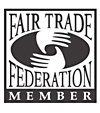Fair Trade FAQ's
How does One World Projects practice Fair Trade?
One World Projects, an established industry player in the Fair Trade, socially and environmentally conscious market, was established in 1992 with the intention of providing sustainable employment to under-privileged artisans from different parts of the world. We import, warehouse and distribute Fair Trade household goods, jewelry, fashion accessories, gifts, toys and other handmade articles produced by more than 100 artisan groups in over 26 different countries throughout Latin America, Africa and Asia. Our commitment to Fair Trade values has always gone beyond the products themselves and is woven into our structure as a worker co-operative and into everything we do.
Many of our products are made from renewable resources, thus providing artisans with incentives to conserve, protect and in many cases restore their natural resources and biologically diverse ecosystems. All One World Projects products provide viable economic alternatives to artisans and their families in developing countries while promoting social and environmental responsibility.
Because of our strong commitment and vision for Fair Trade, we have succeeded in working with thousands of small artisan groups and consumers to create a system of doing business that is in stark contrast to how business is increasingly being done. With our past fueling us, we believe there is still a strong need to connect artisans and consumers and to continue to strengthen this way of trading. We work directly with small artisan groups with a focus on long-term partnerships and programs; we visit our artisan groups time to time, offer trainings, assist them in new product development, provide design ideas, update them about market trends and listen to their concerns and ideas; we educate consumers about the artisans and the story behind the product development, their product choices; and we continually try to improve our own work and build upon the successes of the past to build a better future.
How do I know if a product is really Fair Trade?
All our products are Fair Trade products and most of our food items, like chocolate, rice, quinoa, sugar, etc. are Fair Trade certified. As of right now, craft items cannot be certified Fair Trade, but when you purchase from a member of the Fair Trade Federation you can be assured that every step of the production process has been monitored to ensure that Fair Trade principles have been adhered to.
Why choose Fair Trade instead of donating profits to development projects?
A famous quote we strongly believe in sums up our objective: “Give a man a fish and you feed him for a day. Teach a man to fish and you feed him for a lifetime.”
Our goal as a Fair Trade organization is to support the initiative of small artisan groups and promote their unique handmade products; helping them to help themselves.
We always ensure the price we pay for products is a fair price for hard work and a quality product. These funds have been instrumental in helping artisans and their families earn their livelihood and to be able to support themselves rather than depending on aid.
Do Fair Trade goods cost more than comparable non-Fair Trade goods?
Generally, fairly traded items do not cost more than other goods, because Fair Trade organizations work directly with artisans discouraging middlemen who raise the price along the way in conventional trading. The cost to consumers typically remains the same while a higher percentage of the price is returned to the artisans and farmers who produce the products.
What is the difference between Fair Trade and Free Trade?
Free Trade is the movement of goods between countries without government restrictions and import tariffs to improve efficiency and reduce the cost of goods entering foreign markets. Unfortunately, this system has created a global “race to the bottom” as countries look to increase market share by lowering costs, wages, safety and environmental regulations, among other standards. On the other hand, Fair Trade is a “race to the top.” By treating artisans with respect, paying fair wages, fostering development and upholding high environmental standards, the Fair Trade movement is more interested in increasing the overall living standard of producers rather than just increasing market shares at whatever cost.
Does Fair Trade make a difference?
Positive developments in the life of artisans and their families as a result of the Fair Trade business is proof that it does make a difference. In artisan communities, schools and health clinics are built, wells are constructed, children gain the ability to attend school, community craft centers are established and these are all clear signs indicating that the income generated by Fair Trade sales positively resonates throughout their community. In other less tangible ways, one can note the impact of Fair Trade as well. Cultural techniques are revived; women become valued members of their societies; alternative production methods preserve biodiversity; small and medium-sized enterprises in the developing world increase their capacity.
What can individuals do to support Fair Trade?
Individuals can support Fair Trade by purchasing fairly traded items for their homes, offices, faith communities, schools, or other areas in their lives. They can also support the Fair Trade movement by asking for products from Fair Trade organizations in their local stores, by educating their communities about the Fair Trade options available, by working and volunteering with Fair Trade groups, and much more.
Does my purchase make a difference?
One of our greatest powers as individuals in the western world is how we choose to spend our money. Every time you choose to purchase a Fair Trade item, you support a just and sustainable global economic system. Every Fair Trade purchase made is a step towards the eradication of global poverty.
Think of your purchasing power as a "vote." By purchasing Fair Trade products, you are voting in favor of a sustainable and respectful trading system, which fosters the creation of responsible businesses. At the same time, it pressures big corporations to adopt responsible business practices.
Is this just a passing trend?
That answer depends partly on consumer demand. If you believe in the Fair Trade concept, spread the word. Each time you give a Fair Trade gift, make sure your gift recipient notices, and brag about how that item's sale is helping a developing community in the world. Tell your friends, family and co-workers that you're giving Fair Trade gifts this year, and tell them how to find out more. Try pointing out the fact that more than 70 percent of Fair Trade products are produced by underprivileged female artisans. Buying Fair Trade can make a powerful difference in these women's lives, or the life of any artisan who reaps the benefits of practicing Fair Trade.
Do you offer corporate gift services?
We can help you with your entire socially conscious corporate gift-giving needs. We can work within your budget to give your colleagues a gift that lets them know what you’re all about. We can even have gifts shipped directly to your cust










